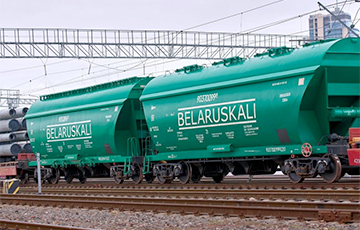Economist: Biggest Blow To Regime Economy Has Already Been Dealt
9- 7.02.2022, 12:32
- 23,488

Minsk didn't expect that Lithuania would shut down the transit of potash.
Over the last few days Belarus has started a sanctions spat with the Baltic republics of Lithuania and Estonia. All this threatens losses of several billions of dollars by the end of the year.
The last few days have become memorable for both the aggravation of the sanctions policy by European countries and the reciprocal actions by Belarus. In addition to blocking of potash transit by Lithuania, Estonia announced blocking of transit of oil products from Belarus, which were delivered bypassing Lithuania. Belarus announced that it was cutting off cargo transportation by rail from Lithuania.
How far can this spat go? And what damage will it do to Belarusian economy? Katerina Bornukova, academic director of BEROC (Kiev), answers these and other questions of the Belarusians and the Market website.
- The biggest blow has already been dealt by Lithuania with the blockage of transit of potash fertilizers. We may lose a significant part of revenue because of it. Taking into account the price growth, it may exceed 3 billion this year. At the same time, finding new transit ways is very difficult. We can see that even Russia is not keen on transporting Belarusian potash. Most likely it is because Russia doesn't have that much spare capacity for transportation. Railway trains are occupied by Russian competitors of Belaruskali, and they are in no hurry to free them.
The second point is Estonia's sanctions. Actually they are not new sanctions but compliance with the sanctions introduced by the European Union. Estonia simply specified a specific commodity code for oil products (2710), which will be banned from import and transportation. In essence, it is a careful implementation of the EU sanctions, so that it would not be possible to supply oil products bypassing the restrictions.
It is difficult to calculate Belarus' losses here, because we are losing not only the export of oil products that we already had, but also a potential corridor for circumventing the EU sanctions. Presumably we are talking about several billion dollars of export revenue.
This is certainly not the best turn of events, but so far nothing tragic has happened. Belarus reacted by banning rail transit from Lithuania. It primarily affects the trade between Lithuania and Ukraine, where oil products and fertilizers are sold. The losses of Lithuania will amount to several hundred million euros. But one should understand that Belarus itself will also suffer from the counter-sanctions. First of all it will affect Belarusian Railways, which has already suffered losses due to the potash sanctions.
Will there be a reciprocal round of sanctions? The Lithuanian government has already stated that they are preparing a response to the Belarusian counter-sanctions. These new restrictions will cause a similar response from Belarus. At the same time, the instruments that both countries can apply are becoming less numerous. Apart from the ban on imports of other goods, it is difficult to imagine any other restrictions. In economic terms, the new 'exchange of courtesies' will become smaller every time, because the biggest trump cards have already been played.
The same story will be developed in the sanctions duel with Estonia. To save face, Belarus will have to respond to unfriendly actions. But the economic scale of sanctions and counter-sanctions is unlikely to increase.
Also, Katerina Bornukova commented for Myfin.by on the statement in the Russian "Kommersant" that Belarus is not even negotiating with Russia to circumvent sanctions and develop alternative supplies of potash. The Russian edition writes that Belarus hopes for a rapid increase in potash prices and the elimination of sanctions because of the critical situation in the market.
- Such public statements by Russian experts and officials should not be trusted. This is because we have already seen on the example of Transneft how the Russians say one thing, but act otherwise. In the public sphere, they try not to admit that they cooperate with companies that are under US and EU sanctions. Transneft persistently declares that it does not supply oil to Naftan, but we see that the company continues to work and by some "magic" means the Belarusian refiner is not running out of oil.
Therefore, I would assume that negotiations are under way, but neither Russian ports nor Russian Railways will make this fact public. One can also assume that Russian companies are afraid of secondary sanctions and therefore avoid negotiations. However, practice shows that secondary sanctions are not effective so far. At least, Lithuania has not stopped working with Russian companies, which continue supplying supplies to Belarusian enterprises.
Regarding price rises and the expectation that sanctions will be lifted. Potash prices have already risen significantly. Obviously, this does not negate the possibility of further increases, but so far the global economy is coping with this. Although there are already publications in the Western press about the impact of sanctions: because of the rise in fertilizer prices, this could severely hurt developing countries in Asia and Africa with a high dependence on agriculture. But we also see that other market players are ready to increase production capacity and can easily cover the shortfall in supplies from Belaruskali.
This statement has already been made by the Canadian producer of potash fertilizers. Russia's Uralkali may also join the race. Therefore, just sitting around and waiting for sanctions to be lifted is not a very farseeing strategy. Another thing is that Belarus probably did not believe that Lithuania would take such a serious step with sanctions without financial support of the European Union. This is a very serious loss for the scale of the Lithuanian economy. Therefore, no one was seriously preparing for the ban on potash transit, and now the search for alternatives is only beginning.










